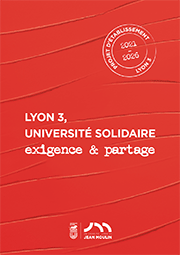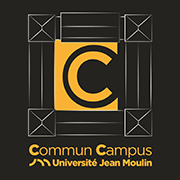AccueilRechercheProgrammes et productions scientifiquesThèsesThèses soutenuesThèses soutenues - 2024
-
Partager cette page
- Recherche,
- Philosophie,
CAIGNARD Gael
Histoires et événements dans la ? condition globale ?. La philosophie après le temps des ? post- ?
Thèse en Philosophie, soutenue le 8 février 2024.
Les défis philosophiques contemporains prennent place dans une condition chargée d’urgences, de transformations radicales, d’instabilité de sens, de catastrophes présentes et à venir. La nécessité d’exprimer les drames de cette condition et d’élaborer des stratégies de compréhension conduit à s’interroger sur les possibilités de la philosophie à l’époque actuelle. Pour cela, la thèse se glisse dans un paradoxe : déployer, dans l’urgence, une longue durée de la pensée. Gardant ce défi comme arrière-plan ontologique, nous questionnons deux domaines inséparables. D’une part, le statut de l’historicité contemporaine et son lien à l’expression philosophique ; d’autre part, le statut des événements, ce qui ébranle, qui surprend, qui para?t inconcevable, qui transforme la continuité du temps, en apportant des significations et des interprétations dans le monde. Histoires et événements sont les deux p?les à travers lesquels nous approchons le problème d’une urgence du présent qui sollicite des réponses rapides, ainsi que d’une pensée qui se développe en méditant les complexités, et qui, elle-même complexe, exige son temps pour se développer. La réflexion débute en considérant la notion de ? post- ?, afin de saisir les tremblements que subit l’historicité entre les années 1950 et 1990. Les ? post- ? (postmoderne, post-Europe, postcolonial, posthumain, posthistoire) décrivent non seulement la temporalité interstitielle de seuils qui s’auto-définissent en rapport à un passé, mais ils annoncent une historicité pluralisée et productive, se déployant dans une multiplicité d’histoires. En s’interrogeant sur les possibilités de la théorie face à cette pluralité, l’étude des ? post- ? montre des discours qui anticipent une critique de la ? condition globale ?, et qui annoncent déjà la nécessité de trouver d’autres vecteurs philosophiques que ceux de la modernité européenne pour l’étudier. Cette ? condition globale ? est analysée et critiquée dans le deuxième moment de l’enquête. En s’opposant d’une part au ? préjugé métaphysique du globe ?, lié à une connaissance totalisante et désincarnée, et d’autre part en montrant l’utilité d’une pensée des ? frictions ? qui ont lieu entre les flux globaux, les aspirations universelles, les situations locales, particulières, terrestres, planétaires, nous étudions le statut ontologique de l’événement contemporain. Pour ce faire, la thèse applique une démarche descriptive, et s’appuie ensuite sur l’ontologie de l’événement qui émerge de la philosophie de Maurice Merleau-Ponty. Ainsi, on décrit les caractères de l’événement ? global ? : il se manifeste partiellement, il n’est jamais tout à fait localisable, il relève de l’inconcevable et il témoigne d’une condition de fragilité partagée dans laquelle on entrevoit les signes d’une dimension terrestre et planétaire. Cette description conduit, dans un troisième moment, à interroger l’historicité et l’expression philosophique qui émergent face aux événements contemporains, en s’appuyant sur la notion de ? Logos du monde esthétique ou naturel ?, que Merleau-Ponty reprend et réinterprète à partir de Edmund Husserl, et en l’intégrant à la pensée de Paul Ricoeur. De cette manière, la thèse atteint le résultat ontologique de lier les deux p?les des histoires et des événements, en proposant les traits d’une architectonique philosophique capable d’exprimer une événementialité dans la longue durée. Pour finir, la thèse interroge la crise de l’ontologie de l’individu, en considérant que l’expression philosophique dégagée dans ces analyses pourrait être caractérisée comme un ? logos du monde dividuel ?, qui refuserait l’idéal d’unité et d’indivisibilité du sujet, en se dirigeant vers une pensée de l’interdépendance, des relations, des hybridations. Face aux frictions du monde contemporain, on trouve, dans une approche co-dividuelle, le sens d’une pratique philosophique patiente et attentive se déployant dans l’urgence du temps présent.
Mots-clés : Histoire ; ?vénement ; ?cologie ; Postmoderne ; Postcolonial ; Dividuel ; Individu ; Narration ; Phénoménologie ; Merleau-Ponty ; Planétaire ; Terrestre ; Anthropocène ; Longue durée ; Friction ; Logos ; Pato?ka ; Ric?ur
Contemporary philosophical challenges take place in a condition fraught with emergencies, radical transformations, instability of meaning, and the perception of present and future catastrophes. The need to express the tragedies of this condition, and to develop strategies of understanding, leads us to question the possibilities of philosophy in the present time. With this aim, the thesis insinuate itself into a paradox: to deploy, in the urgency of the present, a long duration thought. Taking this challenge as our ontological background, we examine two inseparable fields. On the one hand, the status of contemporary historicity and its link to philosophical expression; on the other, the status of events, what shakes, surprises, seems inconceivable, transforms the continuity of time, bringing meanings and interpretations into the world. Histories and events are the two poles through which we approach the problem of an urgency of the present that demands rapid responses, and of a thought that develops itself by pondering complexities, and that, itself complex, requires its time to unfold. We begin by considering the notion of “post-”, to grasp the transformations in historicity between the 1950s and the 1990s. The ?post-? (postmodern, post-Europe, postcolonial, posthuman, posthistory) not only describe the interstitial temporality of thresholds self-defined in relation to the past, but they also herald a pluralized and productive historicity, unfolding in a multiplicity of histories. By questioning the possibilities of theory before this plurality of histories, the study of the ?post-? shows insights that anticipate a critique of the ?global condition?, and that already announce the need to find philosophical vectors of comprehension other than those of European modernity. This ?global condition? is analysed and criticised in the second part of the thesis. On one hand, we underline the risks of a ?metaphysical prejudice of the globe?, understood as a totalising and disembodied knowledge, and, on the other, we show the necessity of thinking the “frictions” involving the global connections, the universal aspirations, and the local, particular, terrestrial and planetary situations. Then we question the ontological status of the contemporary event. To do this, we apply a descriptive approach, and we examine the ontology of the event emerging from the thought of Maurice Merleau-Ponty. We describe the traits of the ?global? event: it manifests itself partially, it is never entirely localizable, it is inconceivable, and it shows a condition of shared fragility in which we can glimpse the signs of a terrestrial and planetary dimension. This description leads us, in a third stage, to question the historicity and philosophical expression that emerges while facing contemporary events. We refer to the notion of the ?Logos of the aesthetic or natural world?, which Merleau-Ponty takes up and reinterprets from Edmund Husserl, and we integrate it with the thought of Paul Ricoeur. In this way, the thesis achieves the ontological result of linking the two poles of histories and events, by proposing the features of a philosophical architectonics capable of expressing evenementiality in the long duration. Finally, the work examines the crisis of the ontology of the individual, considering that the philosophical expression that emerges from this analysis could be characterised as a ?logos of the dividual world?. This “logos” would reject the ideal of the unity and indivisibility of the subject, by moving towards a way of thinking about interdependence, relations, and hybridisation. Faced with the frictions of the contemporary world, we find, in a co-dividual approach, the sense of a patient and attentive philosophical practice unfolding in the urgency of the present time.
Keywords: History ; Event ; Ecology ; Postmodern ; Postcolonial ; Dividual ; Individual ; Narrative ; Phenomenology ; Merleau-Ponty ; Planetary ; Terrestrial ; Anthropocene ; Longue durée ; Friction ; Logos ; Pato?ka ; Ric?ur
Directeur de thèse : Mauro CARBONE
Membres du jury :
- M. CARBONE Mauro, Directeur de thèse, Professeur des universités émérite, Université Jean Moulin Lyon 3, France,
- Mme BORRADORI Giovanna, Rapporteure, Professeure, Vassar College, New York, Etats Unis,
- Mme REVEL Judith, Rapporteure, Professeure des universités, Université Paris 1 Panthéon Sorbonne, France,
- M. CR?PON Marc, Professeur des Universités, Ecole Normale Supérieure, Paris, France,
- M. IRRERA Orazio, Ma?tre de confèrence, Université Paris 8 Vincennes Saint Denis, France,
- Mme MESSORI Rita, Professeure associée, Università degi Studi di Parma, Italie.
Président du jury : Marc CR?PON






